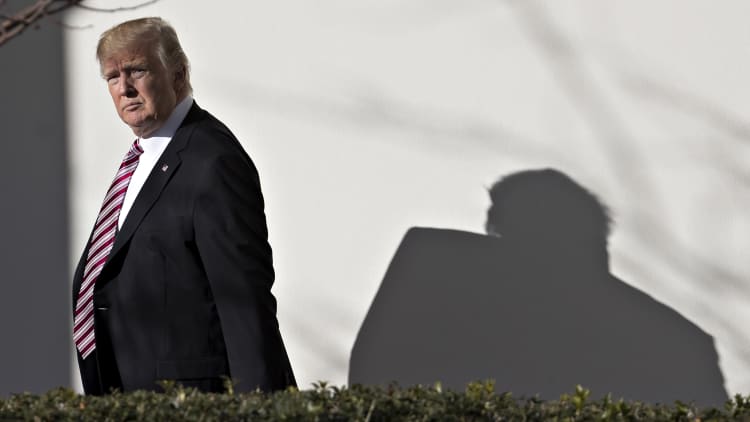
The first time Donald Trump tried to get a health-care bill passed turned out to be a political tragedy for the president — and his grand plan to reform the nation's tax code risks turning into a farce if that recent history is any guide.
Trump is set to make a major speech Wednesday touting the need to cut taxes, but he isn't expected to lay out much of a plan, if any, on how exactly to do that.
The approach – offering up a big idea and then trying to figure out details and strategy with Congress later – is an uncomfortable echo of Trump's failure to get an Obamacare replacement bill passed this summer.
At any other time, a Republican president whose party had control of both chambers of Congress would be seen as sitting in the catbird seat for passing a big tax cut bill.
Now, not so much.
"The president's speech and the pieces" of a bill being discussed don't say anything, said Henrietta Treyz, a tax analyst with Veda Partners in Maryland, and a former staffer on the Senate Finance, Banking and Budget Committee.
"It says nothing except railing against the current system," said Treyz. "Tax cuts are complicated, just like health care is, and you have to explain what the end game here is."
Treyz doesn't think there will be an actual plan until perhaps mid- to late October. "And that means, for the next six weeks or so, Republicans will not have anything to get behind."
She detailed a set of problems that the Trump administration faces in passing a tax reform bill this year, in advance of the 2018 midterm elections.
The first problem, she said, is the fact that Republicans in and outside of Congress "have too many plans" for how to get tax reform done, while "it's unclear what the White House wants."
Each of those existing plans or broad ideas contains elements that are popular with one set of Republicans but unpopular with another set.
"If you go to House Republicans, for instance, they love the idea of a 100 percent capital expense deduction," which could add $2.2 trillion to the federal debt, Treyz said.
"Senate Republicans don't agree with that."
Treyz noted that that there are 41 Republican members of Congress from just five states whose residents are much more apt than other Americans to take advantage of personal tax deductions on mortgage interest, and on state and local taxes.
Other Republicans have eyed eliminating or reducing the value of those deductions as a way to finance other tax cuts, such as reducing the corporate tax rate and lowering the top personal income tax rate.
Trump's habit of lashing out at individual members of Congress, which worked to his disadvantage during the health-care repeal effort, also threatens to undercut his goal of passing comprehensive tax reform legislation. Among those targets were the Senate majority leader, Mitch McConnell.
"They do not have a united Republican conference" in Congress, Treyz said.
Republicans also not have support from Democrats. Nor have they sought it. That same dynamic occurred during the GOP's Obamacare repeal effort in the spring and summer.
Without Democratic support, House Republicans had to come up with bills that pleased nearly every member of their caucus, which proved impossible once the effort moved to the Senate.
The GOP Obamacare repeal bills also were strongly opposed by a wide array of interest groups, including doctors, health insurers, patient advocacy groups and AARP, the lobbying powerhouse for older Americans. Treyz said lobbying groups are already planning to mobilize against aspects of a Trump tax-reform plan that threaten their interests.
"AARP is going to freak out in reaction" to any plan for "reducing retirement incentives" in the tax code, Treyz said.
Treyz also believes Trump could end up fueling even more public opposition to key details of his tax-reform effort by pitching the idea on the heels of Hurricane Harvey, as lawmakers focus on relief legislation.
Trump's tax plan will likely include a large cut of corporate tax rates, as well as the estate tax and the top rate on income. All of those moves would benefit wealthier Americans.
A White House official, during a call with reporters on Tuesday, reportedly was asked how the administration could argue its plan is targeting the wealthy to benefit lower income groups. The official reportedly suggested that a big cut in corporate taxes could be presented as something that would appeal to average Americans.
"If you look at where our business tax rate is compared to the rest of the world ... if you don't bring that down, get us more in line with the rest of the world, give us a competitive advantage or at least level the playing field, it makes no sense," the official said, according to Axios.com.
Treyz noted that her own clients "just want the corporate tax rate" reduced.
But, she added: "The average American ... doesn't think that corporations pay enough."
WATCH: Trump says middle class tax relief 'crucial'



